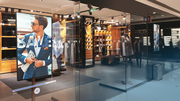Article
Harris Corp. head of digital signage says divestiture 'a very good thing'
Q and A session with the head of DOOH for Harris Corp. reveals upbeat take on sale, 'business-as-usual' approach.

June 5, 2012 by Christopher Hall — w, t
Early last month, tech giant Harris Corp. broke news that it planned to divest itself of its broadcast communication division, which includes its digital signage and digital out-of-home business. The news brought speculation about the future of the company's digital signage division and about the potential albatross of the company's 10-year DOOH network deal with 7-Eleven.
But Denise MacDonell, director and general manager of Harris' DOOH business, said recently that she is encouraged by what she's hearing about potential buyers and interested parties, calling these "exciting times." MacDonell said in a recent interview that this is the "fourth or fifth time" in her career she's been through a divestiture or an acquisition, so she has "a lot of appreciation for the process."
MacDonell sat down for a telephone Q and A with Digital Signage Today to clear the air a bit about what's going on with Harris Corp. and digital signage. The interview appears below, with minor edits for clarity.
Q: Surely news of the planned divestiture has worried your customers and potential customers. What are you doing to reassure people?
A: "Many of the clients that we have and those that we are working on becoming clients don't always have the full information when it comes to the organization design, in terms of where digital out-of-home really fits into Harris Corp.'s overall organization and then how that fits with the broadcast business. So that's usually the first question that I get asked, 'So the broadcast division is being sold, what does that mean for DOOH in terms of how do you fit in?'"
The way that the broadcast organization is structured, MacDonell said, is that there are three operating entities under the broadcast division banner: the transmission business; the infrastructure and networking business, essentially routers and switchers and hardware; and then the media organization, which is where DOOH fits. The media organization is predominantly a software business, for traditional broadcast organizations, doing traffic scheduling and providing automation systems for broadcast.
"So when you think about what happens in a digital out-of-home environment, where you'ree trafficking and scheduling and doing content distribution and asset management, that's where we fit into the broadcast organization, in terms of organizational design. So we take the same technology and apply it to digital out-of-home. It's a very natural fit."
After the plans to divest were announced, she said, and the company started preparing sales information for prospective buyers, something else became very clear:
"Digital out-of-home is a very interesting piece of the portfolio because it does address where the general broadcast market is going, and that is moving content closer to the consumer, and getting content relevancy to the consumer at the point of influence, which is very much what digital out-of-home is about. So we are a nice, unique differentiator in fact from what other broadcast organizations have, and it's being positioned that way. So that's kind of where I start when customers ask me, 'Well, what does this mean, and how do you fit into the overall sale?' We are one of the unique differentiators of this sale that provides whoever is interested in the business a growth engine for the future of media, which is a key part of our overall broadcast business."
MacDonell said she then usually talks people through the mechanics of this kind of sale or divestiture:
"This is a complete business unit sale. So Harris Corp. has been very clear that there is not an appetite to carve out any pieces of the broadcast business and divest of them separately or get out of them separately. It is an entire business unit sale, including everything from IT infrastructure down through contracts and intellectual properties. It's not an asset sale, so that helps explaining that to the market. Plus, I also explain some of the legalities around how contracts actually get assumed. Contracts obviously would be assumed as part of this divestiture in terms of, the acquiring entity would assume all liabilities and ownership of contracts for the entire unit, and if for whatever reason there was a customer or buyer who said, 'Hey I'm going to single out one individual DOOH customer out of the portfolio of contracts and not want that contract,' Harris Corp. owns the paper. So any customer we have is fully protected under any scenario, but the company's been very clear that this is a complete business unit sale, not an asset sale, so the acquiring entity needs to be prepared to take on all of that as part of the sale."
Q: So there is no interest in selling off the digital signage business as a separate entity?
A: "No, definitely not. Because it's being positioned as a differentiator for the broadcast organization as a whole, it would be detrimental to be entertaining selling it off or doing something with it separately. So no, it is part of the entire asset sale."
Q: A potential buyer might be more interested in the digital signage part of the business?
A: "That's right; it really provides a nice growth engine opportunity. I truly believe...that this market is a market that — while it has not had the hockeystick effect that has been projected for years — it has a nice steady growth, and as more and more content continues, from the media standpoint, to be moved out closer to the consumer, again this is something that anyone interested in the broadcast business is going to want to know: 'How are you evolving your portfolio for the demands of the consumer market?' And that's really where we fit in.
"And something else that I don't think a lot of people know is that the president of our broadcast divsion, Harris Morris, he was the person that actually formulated the digital out-of-home business and hired me to run it, so it's something that he is very passionate about and something that obviously he likes to talk about as part of the differentiated piece of the business."
Q: What if no one wants to buy it?
A: (Laughing) "Then that becomes a question for our new CEO, who is wanting to find a buyer for this. I think the likelihood of that is going to be very, very miniscule. Certainly there has been interest already expressed.
"There are a series of announcements that we will be making shortly that will, hopefully, allay again further any question around Harris Corp.'s commitment to this business and this sale and what they're doing to support it."
Q: So, the 7-Eleven network, is that a potential stumbling block for the deal? (Harris is in the early days still of a 10-year deal to run a DOOH network in 7-Eleven stores across the country.)
A: "It's interesting. It's a contract we own, and it's a contract that will be part of the acquiring entity. Is that a contract that the acquiring entity may or may not want to take? That's definitely going to be something that we'll see as we go down the path. It is being, again as part of digital out-of-home and its business, it is being positioned as obviously one of the potential crown jewels inside of our contracts, because it does have a tremendous amount of potential for a patient buyer.
"So it'll be interesting to see how it is perceived through the buying community, but definitely in terms of how we position it, it's not an anchor; it's not a ball and chain; we're not underwater, but we're (also) not generating millions and millions and millions of dollars in revenue yet — but it certainly has the potential to. So I think it almost becomes a neutral dialogue in terms of where it fits today on our revenue contribution, because like I said it's not something that's pulling us underwater, but it's certainly not something that we can go out and say we're generating $75 million, which is the potential value of the contract that we have.
"So we do talk a lot about the upside, and we talk about this market continuing to mature. We've been only at it now, it'll be two years coming up at the end of August that we started the rollout, and over that period of time we've deployed to 4,400 stores and we are now starting to see the fruits of the labor as it pertains to advertising sales.
"And To expect that that would jump to 10 million or 50 million or 100 million dollars in that short period of time I think is unrealistic — anyone would agree with that — but the potential is there. The potential still is there in terms of how we see the revenue growing over what is effectively a 10-year agreement, so we're only at its infancy."
Q: Finally, what else do people need to know?
A: "I think what I want to make sure we continue to get the message out is that while, yes, Harris Corp. is getting out of the broadcast business, there is nothing happening that you wouldn't have had happening with the digital out-of-home business six months ago. We are part of the broadcast organization, so that means we'll be assumed by a new purchasing entity, but the same people are here, in fact we're hiring people ... we are continuing to close business and to support our customers. That's really been a key point, for myself anyway, as I talk thought this environment with existing customers and for those who are interested in doing business with us: Really, the risk is miniscule in terms of what this all means.
"In fact, probably in terms of the long-term view, if this wasn't happening, if we were staying as part of Harris Corp., I think that this is a much better proposition for us long term, because Harris Corp. is retrenching back into its government roots. It really is looking at the environment that's hitting certainly the U.S. government at the moment. There's a lot of reduced spending on the defense side of the business, which is a huge part of Harris Corp.'s business. They're facing significant headwinds, and so they're retrenching — and it's not good for a commercial division to be working for a government company that's on a retrenchment. And so from that perspective this is a really good thing for us; we are very excited about the opportunity to become a commercial entity outside of the Harris government banner.
"While we appreciate everything Harris Corp. has represented for us over the years, as I talk to customers about investment, as an example, this will give us the freedom and flexibility to have our investments go in a way that matches our growth, as opposed to if we had stayed with Harris Corp. A lot of our profits that we would throw off could potentially be seconded to help the government business, so this is a very good thing. 'Business as usual' is a mantra that you hear a lot, but truly we are supporting our customers and delivering our solutions in no way shape or form differently than we did six months or a year ago."
Read more about digital signage software.
 ChatGPT
ChatGPT Grok
Grok Perplexity
Perplexity Claude
Claude







